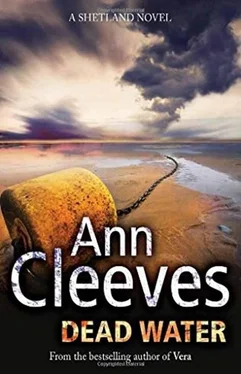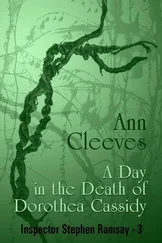‘Did he go out in his car?’ Perez was trying to eep his voice calm, but he thought this might be something new. If John Henderson had met Jerry Markham on the afternoon he died, they might be close to finding a motive for Henderson’s death. If he’d seen or heard something, the killer might have been forced to stop him talking.
‘I don’t know. There was a thick fog. It came in very suddenly. It was quite clear when John came into the office for the meeting, but when he went I couldn’t even see the tugs across the water. I don’t think I heard his car, but then the fog muffles sound too. I assumed he’d driven away.’
‘And he came back that afternoon?’ Perez asked. He glanced across at Willow, who seemed sharper, more alert. She’d recognized the significance of this piece of news too.
‘Yes, almost an hour after he’d left,’ Sinclair said. ‘He put his head round the door to let me know.’
‘How did he seem?’
Sinclair gave a little laugh. ‘How could I tell? John was never one for showing his emotions at the best of times. And I saw him for a second as he called in to let me know he was back.’ He paused and became suddenly serious. ‘But he didn’t look like a man who’d just committed murder. Don’t go down that route, Jimmy. John Henderson was a good man. I’ll not have his memory sullied by rumours.’
They sat for a moment in silence. The wind blew some scrap paper round the yard outside the office. Sinclair frowned at it as if it was an affront to his idea of order.
‘John was working here after Jerry had died,’ Perez said. ‘Did he talk at all about what had happened?’
‘Everyone was talking about it! Jerry Markham wasn’t the most popular man in Shetland, as you’ll have gathered. So it was almost as if folk were taking pleasure in the fact that he’d been killed. Enjoying the excitement anyway. The drama of the Fiscal finding him in the racing yoal.’
‘And what was John’s reaction?’
‘He said it was wrong to treat another man’s death as a subject of gossip. There was always something of the preacher in John, and sometimes the men didn’t take to it. For example, he didn’t like swearing. Get a bunch of seamen together and there’s always going to be swearing. Usually he was mild enough and didn’t make a fuss about it. Just a gentle comment that they should watch what they were saying. But the talk about Markham upset him. I thought he was going to lose his temper, but he walked away from them. Again I asked him if he was OK. He didn’t really answer. That was the last time I talked to him.’
Andy Belshaw had said that Henderson had been excited about Markham’s death and had wanted to talk about it. Was the discrepancy significant? Or was it the result of two witnesses with different perspectives? Perez wasn’t sure.
‘You worked with Evie on the tidal-power project?’
‘Aye. And that was kind of a favour to John. She wanted some local folk to support her and reckoned I’d know something about the tides. I asked John why he didn’t do it himself, but he’d never been one for committees. The Fiscal was there too that morning.’
‘And does she know about tides?’
Sinclair allowed himself a little smile. ‘More than you’d think! She’s a fine sailor. That Contessa of hers is a big yacht for one woman to manage, and she’s a natural. She also has a sense of the next big thing politically. It’s not the good of the planet that she has on her mind, but the good of Ms Rhona Laing.’
‘How did they seem?’ Willow asked. It appeared that she’d been following the conversation after all. ‘The two women, I mean.’
Sinclair shrugged. ‘They sniped at each other. Nothing rude. All very polite. But cats in a bag, you know. It was Evie’s project, but the Fiscal’s never been one to play a subordinate role. I let them get on with it.’ He stood up. ‘Look, I’m sorry – I’ve got to go. Yet another meeting. This one in Lerwick.’ He walked with them from the office towards their car.
Willow suddenly asked, ‘What do you make of her? Of the Fiscal?’
If the question surprised him, Sinclair didn’t let it show. ‘She’s good at her job. A tad officious at times. Folk have taken a time to get used to her ways.’
‘Has she ever visited you here?’
‘No! What reason would she have to do that?’
The harbour master stood watching them get into the car. Driving away, Perez saw him stoop to pick up the piece of paper that had been flying around the yard and stuff it into a bin.
The Fiscal was back at work. She left her office, walked past the whitewashed police station and crossed the road to the Gothic town hall. Gusts of wind tugged at her skirt and made her eyes water. She hoped her mascara hadn’t run, and in the lobby stopped for a moment to check her reflection in the glass door. She’d considered sending her apologies to this meeting, but had known all along that the only response to these murders was to behave as usual. That was the message she’d send to the forum. And pretending that she was perfectly in control was her way of holding things together personally too.
The Shetland Community Forum met once a month to consider matters of importance to the islands. It had been the brainwave of the police superintendent in Inverness as a response to increased drug abuse in the islands. Community engagement, he’d said, was the answer. Rhona Laing thought he must have recently attended a course on the subject. Something put together by sociologists. Naturally he never ventured north to attend these gatherings. A number of prominent Shetlanders, leaders of trusts and social organizations, councillors and politicians had been invited to join. Most months half a dozen people turned up, sat round a table and decided very little. Rhona was usually there, as a matter of principle: she’d agreed to join and so she should attend. After a particular long-winded meeting she’d agreed to act as chair. Today she expected a bigger turnout than usual and was regretting that decision. She wasn’t sure she could go through with it, that she could hold herself together.
And at the top of the stairs she saw that there was a queue forming as people waited to filter into the meeting room. She saw Joe Sinclair waiting patiently in line and he gave her a little wave. Like her, he was a regular forum member. They served together on a number of island committees. She’d asked him once if he had ambitions to become a councillor – she couldn’t imagine why else he might agree to all these time-consuming meetings – and he’d smiled knowingly. ‘Not now,’ he’d said. ‘There’s enough in my life at present. But I can’t imagine retiring and having nothing to do.’
‘You’ve got your boat,’ she’d said. ‘Your fishing.’
‘Maybe, but I don’t think that would be enough for me. I like to feel I have influence. So it’s not bad practice turning out at this sort of event.’
It took longer than usual to provide everyone with tea and coffee. The urn ran out and a woman scurried away to boil a kettle. Outside it had started to rain steadily and water ran down the windowpane. Soon condensation made it impossible to see out. The main agenda item was the impact of the gas development at Sullom, but that was abandoned almost from the start. A tall, dark man stood up. He had an educated English accent.
‘My name’s Mark Walsh and I run a guest house in Hvidahus. I must say I’m surprised the police aren’t present today to explain their lack of progress in the North Mainland killings. The murders have already had an effect on business. I had two cancellations yesterday.’
Without getting to his feet Joe Sinclair said, in an aside, but loud enough for the whole room to hear, ‘I dare say the police have got better things to do with their time just now.’
Читать дальше












